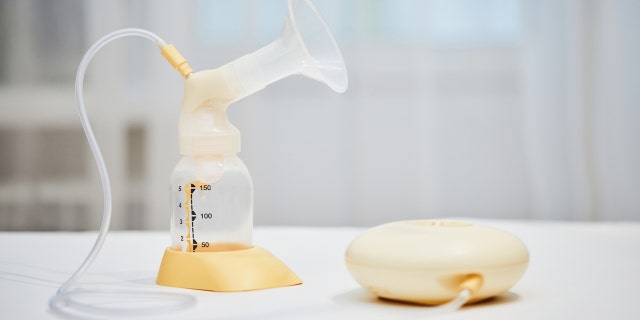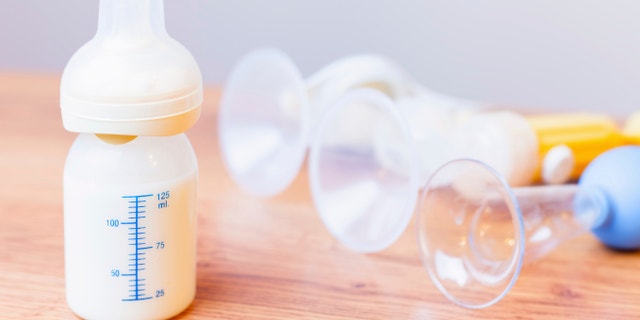Health
Male health care leaders complete ‘simulated breastfeeding challenge’ at Texas hospital: ‘Huge eye-opener’

To commemorate World Breastfeeding Week, which was the first week of August, a group of male health care leaders at Covenant Health participated in a “simulated breastfeeding challenge,” as FOX34 reported.
Covenant Health is a Christian health network located in Lubbock, Texas.
For four days, the men simulated the act of breastfeeding every three hours for 20-minute stints, the report stated. They summarized their daily experiences in video diaries.
The goal was to get an idea of the challenges working mothers face when breastfeeding and having to pump milk at the workplace during the day.
BEST FOR BABY AND MOTHER? AAP’S NEW GUIDELINES ON NURSING HAVE MOMS IN A QUANDARY
“Wondering why I agreed to do this,” Matt Mitchell, interim director of critical care, said in his video diary, according to the report.
“First day was pretty rough,” he also said. “It got a little bit easier once you got the schedule down, but a whole new perspective for sure.”
To commemorate World Breastfeeding Week, which was the first week of August, a group of male health care leaders at Covenant Health participated in a “simulated breastfeeding challenge.” Said one participant, “There was no way to multitask.” (iStock)
Some of the men reported missing pumping sessions, as it was challenging to schedule them around work obligations, they said.
Others said that given the difficulties of breastfeeding, they would opt to use formula instead.
“There was no way to multitask,” said Walt Cathey, CEO of Covenant Health.
“I mean, you’re basically having to hold the two pumps, so you couldn’t really do anything for 30 minutes.”
“There was no way to multitask … you couldn’t really do anything for 30 minutes.”
Another challenge the men faced was finding private spaces to pump.
“I made the effort to go sit in a public restroom for 20 minutes,” which was “uncomfortable from a vulnerability standpoint,” Mitchell said.
BREASTFEEDING BAN: GEORGIA MOTHER IS TOLD SHE CAN’T NURSE HER BABY AT WATERPARK, SPARKING DEBATE
“Finding a place that you feel is secure for you is definitely difficult,” Cathey said in his video diary, noting that he did not have enough privacy in his office or in a conference room, per the report.

Covenant Health offers a “lactation lounge” for moms who need to breastfeed at work, the report said, but the men said the simulation helped them understand the logistical challenges involved. (iStock)
“Even with my two rooms, I was always sitting there going, ‘Man, who’s gonna walk in?’” Cathey said.
While Covenant Health offers a “lactation lounge” for moms who need to breastfeed at work, the report said, the men said the simulation helped them understand the logistical challenges involved.
“This is the first time we’ve really kind of challenged ourselves to look in the mirror on this situation,” Cathey said, per the report.
“What we had to do was minimal in comparison to what our working moms go through.”
“We have to create a more open environment for our moms to feel comfortable — I mean, we are health care.”
“It was a huge eye-opener for me,” he continued. “The dedication that they put into this — you can’t have anything but respect for these ladies.”

The goal of the challenge was for men to get an idea of the challenges working moms face when breastfeeding and having to pump at work. (iStock)
The men said the exercise deepened their respect for what working mothers must juggle.
“What we had to do was minimal in comparison [to] what our working moms go through — being pregnant, giving birth, and even after that, sustaining life for this infant. It’s incredible,” Mitchell said.
Amy Wenger, co-executive director of the Vermont Donor Milk Center and a childbirth and newborn educator, agreed that the biggest challenge is for women to have the “appropriate time and space” built into the day in order to pump, as well as the feeling that they can do this consistently without being made to feel “like a burden,” she said.
CLICK HERE TO SIGN UP FOR OUR HEALTH NEWSLETTER
“There should be mandatory policies … that support this,” Wenger told Fox News Digital.
“It should be a conversation prior to delivery about what support their business can have for them when they get back to work.”

There is the “grieving” that comes with not being able to feed one’s own baby and not being supported to do so, said one childbirth and newborn educator. It can be “a core memory that is carried throughout a woman’s life.” (iStock)
“There should also be policies on how the states can support employers to make this happen,” she added.
Regarding breastfeeding simulations like the one done at Covenant Health, Wenger said they cannot replicate the full spectrum of the challenges women face.
“Not only is there the hormonal piece, but there is the discomfort, the expectations and the overwhelming feeling of not being able to feed your baby.”
“Not only is there the hormonal piece, but there is the discomfort, the expectations and the overwhelming feeling of not being able to feed your baby,” she said.
“The mental load that women have as the sole responsible person to feed their baby is more than any simulation” could represent, Wenger said.
There is also the “grieving” that comes with not being able to feed one’s own baby and not being supported to do so, she said.

Some of the men in the challenge said that given the difficulty of breastfeeding — they would opt to use formula instead. (iStock)
“That feeling becomes a core memory that is carried throughout a woman’s life,” she said.
“It affects [women’s] mental and sometimes physical health.”
Wenger called for giving postpartum and lactating women the “space and support they need with their babies, more than just a couple of weeks when they themselves are healing.”
The benefits of breastfeeding include better nutrition, growth and development for babies, as well as the prevention of certain illnesses and diseases in both mom and baby, per the CDC.

Health
Drinking alcohol is linked to six types of cancer, experts say: ‘It’s toxic’

It’s long been known that no amount of alcohol is good for the body — and now new research spotlights the potential harm it can cause.
More than 5% of all cancer cases are caused by drinking alcohol, according to the Cancer Progress Report 2024 from the American Association for Cancer Research (AACR).
Among the modifiable risk factors for cancer, alcohol is the third biggest, behind obesity (7.6% of cases) and cigarette smoking (19.3%).
TO REDUCE CANCER RISK, SKIP THE ALCOHOL, REPORT SUGGESTS
“Excessive levels of alcohol consumption increase the risk for six different types of cancer, including certain types of head and neck cancer, esophageal squamous cell carcinoma, and breast, colorectal, liver and stomach cancers,” said Rajarshi Sengupta, PhD, lead author of the AACR Cancer Progress Report 2024, in a statement sent to Fox News Digital.
More than 5% of all cancer cases are caused by drinking alcohol, according to the Cancer Progress Report 2024 from the American Association for Cancer Research. (iStock)
“Further, research shows that alcohol intake at an early age can increase the risk of cancer later in life.”
Based on these findings, limiting or eliminating alcohol can reduce the risk of developing alcohol-related cancers by 8% and the risk of all cancers by 4%, the report noted.
Addiction expert warns of risks
There has been a “roller coaster of information” about whether alcohol is harmful, according to addiction psychiatrist Dr. Adam Scioli of Caron Treatment Centers in Pennsylvania.
“There have even been reports for years that it could be beneficial for one’s health — but we know now that alcohol ingestion is one of the modifiable risk factors for cancer,” Scioli, who is not affiliated with AACR, told Fox News Digital.
‘DOES SMARTPHONE EXPOSURE CAUSE BRAIN CANCER?’: ASK A DOCTOR
Around 75,000 Americans each year are diagnosed with a cancer that is linked in some way to alcohol use, according to Scioli.
The more someone drinks — both in volume and frequency — the higher the risk, he warned.

Among the modifiable risk factors for cancer, alcohol is the third biggest, behind obesity (7.6% of cases) and cigarette smoking (19.3%). (iStock)
“Alcohol is a toxin,” Scioli said.
“We’ve long known that it impacts any number of organs, essentially starting with the brain and working its way down to the colorectal system.”
Is there a ‘safe’ amount?
Moderate alcohol use is defined as one drink or less in one day for women.
For men, it is two drinks or fewer per day, according to the Centers for Disease Control and Prevention (CDC).
“We’ve long known that alcohol impacts any number of organs, starting with the brain and working its way down to the colorectal system.”
“Drinking alcohol in moderation may increase your overall risks of death and chronic disease,” the agency stated on its website.
“Even low levels of alcohol use (less than one drink per day) can raise the risk of certain cancers.”
Scioli agreed, emphasizing that “we can definitely say there’s no added health benefit to ingestion of alcohol.”
“The line between safety and danger is debatable, and is different for each person.”
While risk factors like tobacco use are widely known, public awareness about the link between alcohol and cancer is still low, according to Sengupta.

Moderate alcohol use is defined as one drink or less in one day for women, and two drinks or fewer for men, per the CDC. (iStock)
Most Americans (51%) are not aware that alcohol increases cancer risk, per AACR data.
“It’s been flying under the radar for far too long — especially given the number of Americans who have met the criteria for alcohol use disorder, which is around 29 million Americans in 2023,” said Scioli.
What needs to change?
The good news, according to Scioli, is that with modifiable risk factors like alcohol, reducing the intake decreases the risk.
CLICK HERE TO SIGN UP FOR OUR HEALTH NEWSLETTER
As the report stated, those who are successful in decreasing their drinking or abstaining below those moderate risk levels will see a risk reduction in overall cancers, he noted.

Around 75,000 Americans each year are diagnosed with a cancer that is linked in some way to alcohol use, an expert said. (iStock)
“We need to do a much better job of making the public aware of the risks inherent in drinking — particularly moderate to heavy drinking,” Scioli said.
“And we need to make the public aware that there are mechanisms by which they can access help if they are unable to moderate their drinking or quit on their own.”
For more Health articles, visit www.foxnews.com/health
To help raise awareness, Sengupta of the AACR called for public messaging campaigns, “such as cancer-specific warning labels displayed on alcoholic beverages.”
Along with that, she told Fox News Digital, “effective clinical strategies that reduce or eliminate alcohol consumption must be considered to reduce the burden of alcohol-related cancers.”
Health
Intermittent Fasting + Walking: The Science-Backed Combo That Helped This Grandma Lose 3X the Weight

Sign Up
Create a free account to access exclusive content, play games, solve puzzles, test your pop-culture knowledge and receive special offers.
Already have an account? Login
Use left and right arrow keys to navigate between menu items.
Use escape to exit the menu.
Health
New schizophrenia drug gets FDA approval, taking novel approach to treating brain disorder

A new drug has been approved for the treatment of schizophrenia in adults.
On Thursday, the U.S. Food and Drug Administration (FDA) approved COBENFY (xanomeline and trospium chloride), an oral medication that is manufactured by Bristol Myers Squibb in New Jersey.
This marks the first new class of medications for the brain disorder in several decades, according to a press release.
5 MYTHS ABOUT SCHIZOPHRENIA, ACCORDING TO A MENTAL HEALTH EXPERT: ‘HUGE STIGMA’
COBENFY is expected to be available in the U.S. in late October, the company noted.
A new drug has been approved for the treatment of schizophrenia in adults. (iStock)
“Today’s landmark approval of our first-in-class treatment for schizophrenia marks an important milestone for the community, where after more than 30 years, there is now an entirely new pharmacological approach for schizophrenia — one that has the potential to change the treatment paradigm,” said Chris Boerner, PhD, board chair and chief executive officer at Bristol Myers Squibb, in the press release.
STUDY REVEALS HEAVY MARIJUANA USE IS LINKED TO SCHIZOPHRENIA
Schizophrenia is a serious mental illness that affects a person’s thoughts, feelings and behaviors.
It often causes hallucinations, delusions, disordered speech and loss of touch with reality, Mayo Clinic states on its website.

COBENFY (xanomeline and trospium chloride) is an oral medication that is manufactured by Bristol Myers Squibb in New Jersey. (Bristol Myers Squibb)
The disorder can also lead to lack of emotional expression, lack of motivation, cognitive dysfunction and social withdrawal.
Approximately 2.8 million people in the U.S. and 24 million people globally are living with schizophrenia.
AI-DISCOVERED DRUG SHOWS ‘ENORMOUS POTENTIAL’ TO TREAT SCHIZOPHRENIA: ‘REAL NEED FOR BETTER TREATMENT’
The disorder has traditionally been treated with antipsychotic medications, but around 40% of patients do not respond to treatments and 60% experience “inadequate improvement” in symptoms or “intolerable side effects,” studies have shown.

COBENFY is expected to be available in the U.S. in late October, the company noted. (Bristol Myers Squibb)
COBENFY works differently than the currently available schizophrenia medications.
“Due to its heterogeneous nature, schizophrenia is not a one-size-fits-all condition, and people often find themselves in a cycle of discontinuing and switching therapies,” said Rishi Kakar, MD, chief scientific officer and medical director at Segal Trials and investigator in the drug’s clinical trials, in the release.
“Schizophrenia is not a one-size-fits-all condition, and people often find themselves in a cycle of discontinuing and switching therapies.”
“The approval of COBENFY is a transformative moment in the treatment of schizophrenia because, historically, medicines approved to treat schizophrenia have relied on the same primary pathways in the brain.”
“By leveraging a novel pathway, COBENFY offers a new option to manage this challenging condition.”

“Today’s landmark approval of our first-in-class treatment for schizophrenia marks an important milestone for the community,” said Chris Boerner, PhD, board chair and chief executive officer at Bristol Myers Squibb. (iStock)
Sam Clark, founder and CEO at Terran Biosciences — a biotech company that develops treatments and technologies for neurological and psychiatric diseases in New York City — commented on the new approval in a statement sent to Fox News Digital.
“I am excited that the FDA has just approved [COBENFY] as a treatment for patients with schizophrenia, marking a big leap forward in the psychiatry space,” he said.
“These patients live with a difficult disease, and this drug with a novel mechanism of action will surely make a significant impact,” Clark continued.
“We look forward to seeing the renaissance continue as this approval paves the way for future breakthroughs and novel patient-focused therapeutics.”
CLICK HERE TO SIGN UP FOR OUR HEALTH NEWSLETTER
The approval follows three phases of clinical trials in which COBENFY was shown to result in a “statistically significant improvement in illness.”

Schizophrenia is a serious mental illness that affects a person’s thoughts, feelings and behaviors and often causes hallucinations and delusions. (iStock)
In terms of safety, the medication’s most common side effects during clinical trials were nausea, indigestion, vomiting, diarrhea, constipation, hypertension, abdominal pain, accelerated heart rate, dizziness and gastroesophageal reflux disease, the release stated.
Patients with certain existing medical conditions may experience other, more serious risks.
For more Health articles, visit www.foxnews.com/health
People should discuss potential complications with a doctor before starting the medication.
Fox News Digital reached out to Bristol Myers Squibb and the Schizophrenia & Psychosis Action Alliance requesting comment.
-

 News1 week ago
News1 week agoToplines: September 2024 Inquirer/Times/Siena Poll of Pennsylvania Registered Voters
-

 Business1 week ago
Business1 week agoVideo: Federal Reserve Cuts Interest Rates for the First Time in Four Years
-

 News7 days ago
News7 days agoVideo: Who Are the Black Swing Voters?
-

 Politics1 week ago
Politics1 week agoDem lawmakers push bill to restore funding to UN agency with alleged ties to Hamas: 'So necessary'
-

 Politics1 week ago
Politics1 week ago'I've never seen this': Top Republican details level of Secret Service 'lack of cooperation'
-

 News1 week ago
News1 week agoElection 2024 Polls: Florida
-

 World1 week ago
World1 week agoCritics slam landmark EU competitiveness report as 'one-sided'
-

 Finance1 week ago
Finance1 week agoThis ETF uses ChatGPT to invest like Warren Buffett
















